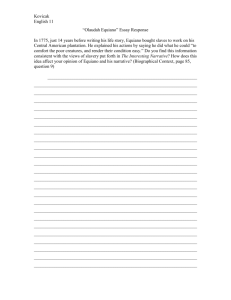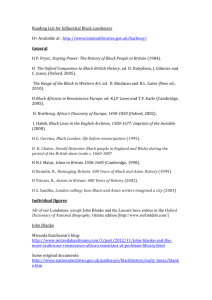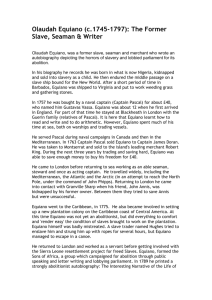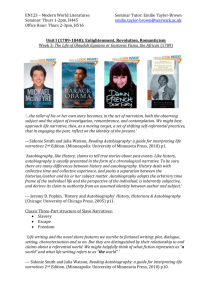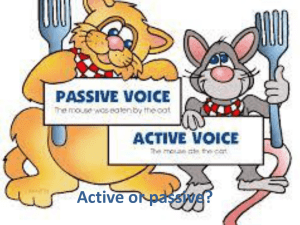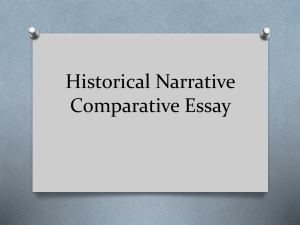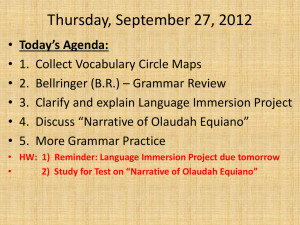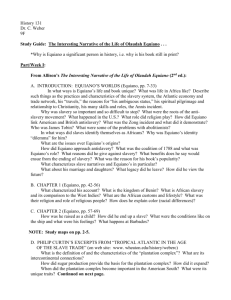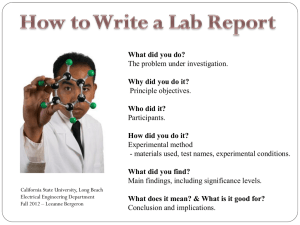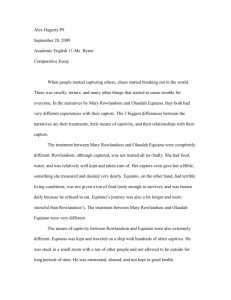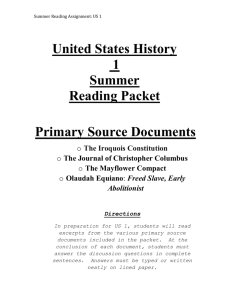Teaching Grammar in Context PD
advertisement
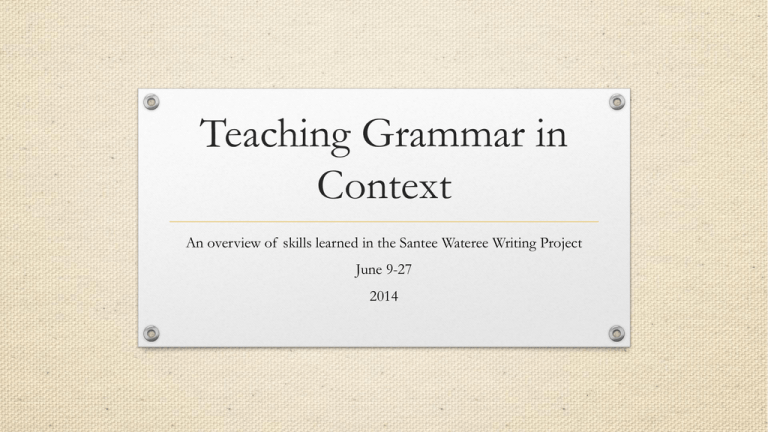
Teaching Grammar in Context An overview of skills learned in the Santee Wateree Writing Project June 9-27 2014 What is the National Writing Project? • • National Writing Project Information Once you have successfully completed the SWWP Summer Writing Workshop you will be a Teacher Consultant for the National Writing Project. Understanding the core principles of the NWP is best way to explain your efforts in this class to those curious about the writing project. NWP Core Principles • The core principles at the foundation of NWP’s national program model are: Teachers at every level—from kindergarten through college—are the agents of reform; universities and schools are ideal partners for investing in that reform through professional development. • Writing can and should be taught, not just assigned, at every grade level. Professional development programs should provide opportunities for teachers to work together to understand the full spectrum of writing development across grades and across subject areas. • Knowledge about the teaching of writing comes from many sources: theory and research, the analysis of practice, and the experience of writing. Effective professional development programs provide frequent and ongoing opportunities for teachers to write and to examine theory, research, and practice together systematically. • There is no single right approach to teaching writing; however, some practices prove to be more effective than others. A reflective and informed community of practice is in the best position to design and develop comprehensive writing programs. • Teachers who are well informed and effective in their practice can be successful teachers of other teachers as well as partners in educational research, development, and implementation. Collectively, teacher-leaders are our greatest resource for educational reform. Why is it important to teach grammar in context? • “We will save ourselves a lot of frustration if we shift our notion of teaching punctuation and grammar to one of teaching principles instead of rules” (Anderson 4). • “Grammar and mechanics are not rules to be mastered as much as tools to serve a writer in creating a text readers will understand” (Anderson 5). Research Says: • “Recent brain research shows that we learn in a web like fashion-the web of context. The brain searches for patterns and simultaneously goes down many paths. I cannot teach in isolation and expect kids to apply it. I have to guide students by building an environment that supports writers in becoming their own critics, kids who look to punctuation and grammar to make their messages clear and interesting” (Anderson 10). Mentor Text • “Mentor text shows the error in another light: the light of correctness. If students are going to stare at writing and talk about it, they must see powerful writing models” (Anderson 61-62). • By seeing the writing of various authors who model text correctly and powerfully, students gain an understanding of how language should be expressed. Mentor Text • Anderson concludes from Mikhail Bakhtin’s research that “what we hear and see will end up in our writing sooner or later” (Anderson 18). Mentor Text • “Imitating structure- whether it’s the structure of sentences, the structure of paragraphs, or even the structure of entire works- has been used successfully by teachers for decades. Bonniejean Christensen’s The Christensen Method (1979), a comprehensive writing program for high school students based on Francis Christensen’s work, relies heavily on imitating sentence and paragraph structures. In Art of Styling Sentences, Waddell, Esch, and Walker (1972) argued that imitation dramatically improved the writing of their university students (vii). Similarly, research by Daiker, Kerek, and Morenberg (1990) at the University of Miami found that freshman composition students who imitated professional sentence structures ‘for a semester wrote papers that were graded higher than those written by students who had not’ (4)” (Noden 69). The Writing Workshop Model • Mini Lesson- Active and Passive Voice • A verb is in the active voice when the subject of the sentence performs the action. • I expected every hour to share the fate of my companions. • The ship took in all the cargo. • The groans of the dying turned the scene into almost inconceivable horror. • Students write one sentence in the active voice. Mini Lesson: Active and Passive Voice • A verb is in the passive voice when the action is performed on the subject. The passive voice consists of a form of the helping verb be plus the past participle of the main verb. When the performer of an action is not known or is not important, the writer uses the passive voice. • Eventually they were purchased. (Passive) • Eventually slaveholders on Barbados purchased them. (Active) • Equiano and his sister were kidnapped from their home in West Africa. (Passive) • Slave traders kidnapped Equiano and his sister from their home in West Africa. (Active) Active/ Passive Voice Practice • Active Voice: They tossed the remaining fish into the sea. • Passive Voice: • Passive Voice: We thought we should be eaten by these ugly men. • Active Voice: The Interesting Narrative of the Life of Olaudah Equiano Read Mentor Text The Interesting Narrative of the Life of Olaudah Equiano • Students respond in writer’s journal • Write about the author’s writing style or your thoughts concerning the content of what you read. Share Sessions • Have students read a piece of writing aloud. • Have students respond to questions like these: • “What did you learn from this piece of writing? • What did the writer do well? • What questions do you have?” (Flectcher & Portalupi 41-42) Exit Slip • Write one sentence in the active voice that tells me something you think or feel about Olaudah Equiano. Works Cited • “About NWP: NWP Core Principles.” National Writing Project. 2014. Web. 16 June 2014. • Anderson, Jeff. Mechanically Inclined. Portland: Stenhouse Publishers, 2005. Print. • Anubis Television. Youtube: The Interesting Narrative Of The Life Of Olaudah Equiano. 8 December 2008. 14 June 2014. • Equiano, Olaudah. "The Interesting Narrative of the Life of Olaudah Equiano." Literature: Timeless Voices, Timeless Themes - The American Experience. Glenview: Prentice Hall, 2000. 44-47. Print. • Fletcher, Ralph and JoAnn Portalupi. Writing Workshop: The Essential Guide. Portsmouth: Heinemann, 2001. Print. • Noden, Harry R. Image Grammar: Using Grammatical Structures to Teach Writing. Portsmouth: Heinemann, 1999. Print.
